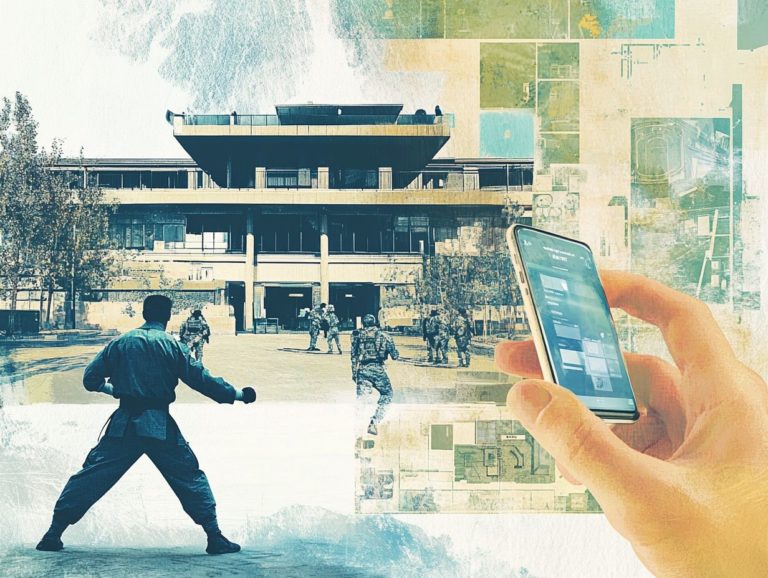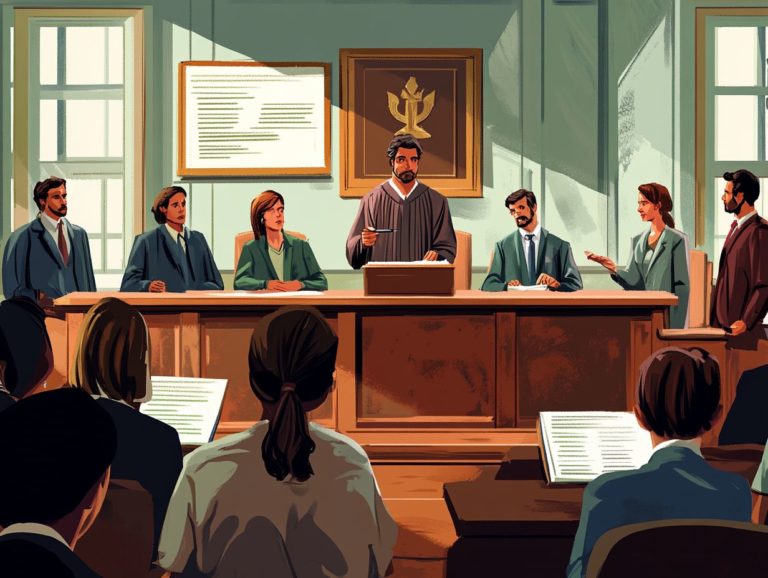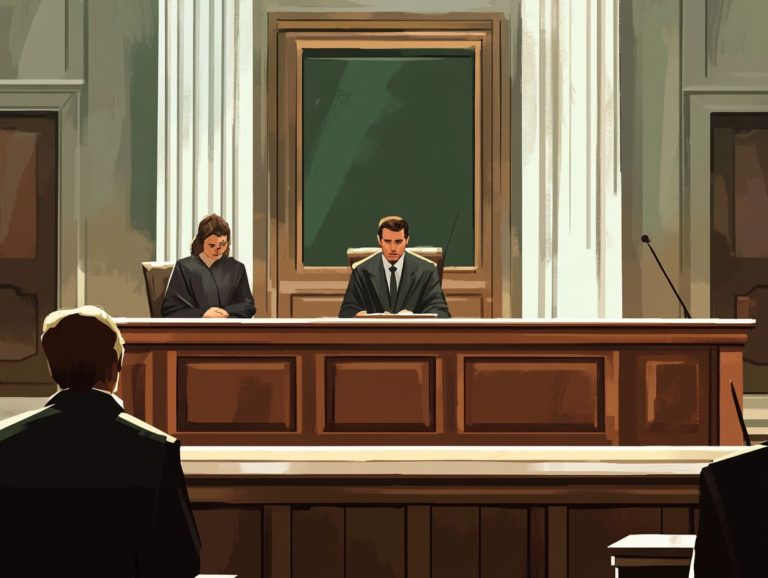How to Handle Witness Testimony in Defense
Witness testimony holds a crucial position in the realm of defense, frequently strongly influencing the outcome of a case.
This article delves into the significance of witness testimony, offering insights on how to efficiently gather and organize evidence, prepare witnesses for their court appearances, and present their testimonies with persuasive impact.
It also tackles common challenges and objections, providing you with effective tips for cross-examination and strategies for addressing inconsistencies.
Whether you’re a legal professional or simply intrigued by the intricacies of courtroom dynamics, this guide will elevate your understanding of witness testimony in defense!
Contents
- Key Takeaways:
- The Importance of Witness Testimony in Defense
- Preparing for Witness Testimony
- Presenting Witness Testimony in Court
- Challenges and Objections to Witness Testimony
- Cross-Examination of Witness Testimony
- Handling Inconsistent or Unreliable Witness Testimony
- Preguntas Frecuentes
- 1. Qu es el testimonio de un testigo en un caso de defensa?
- 2. C mo debo prepararme para manejar el testimonio de testigos en defensa?
- 3. Puedo interrogar a un testigo en un caso de defensa?
- 4. C mo manejo a un testigo que no es cooperativo?
- 5. Puedo usar testigos de car cter en un caso de defensa?
- 6. Qu debo hacer si el testimonio de un testigo contradice declaraciones anteriores?
Key Takeaways:
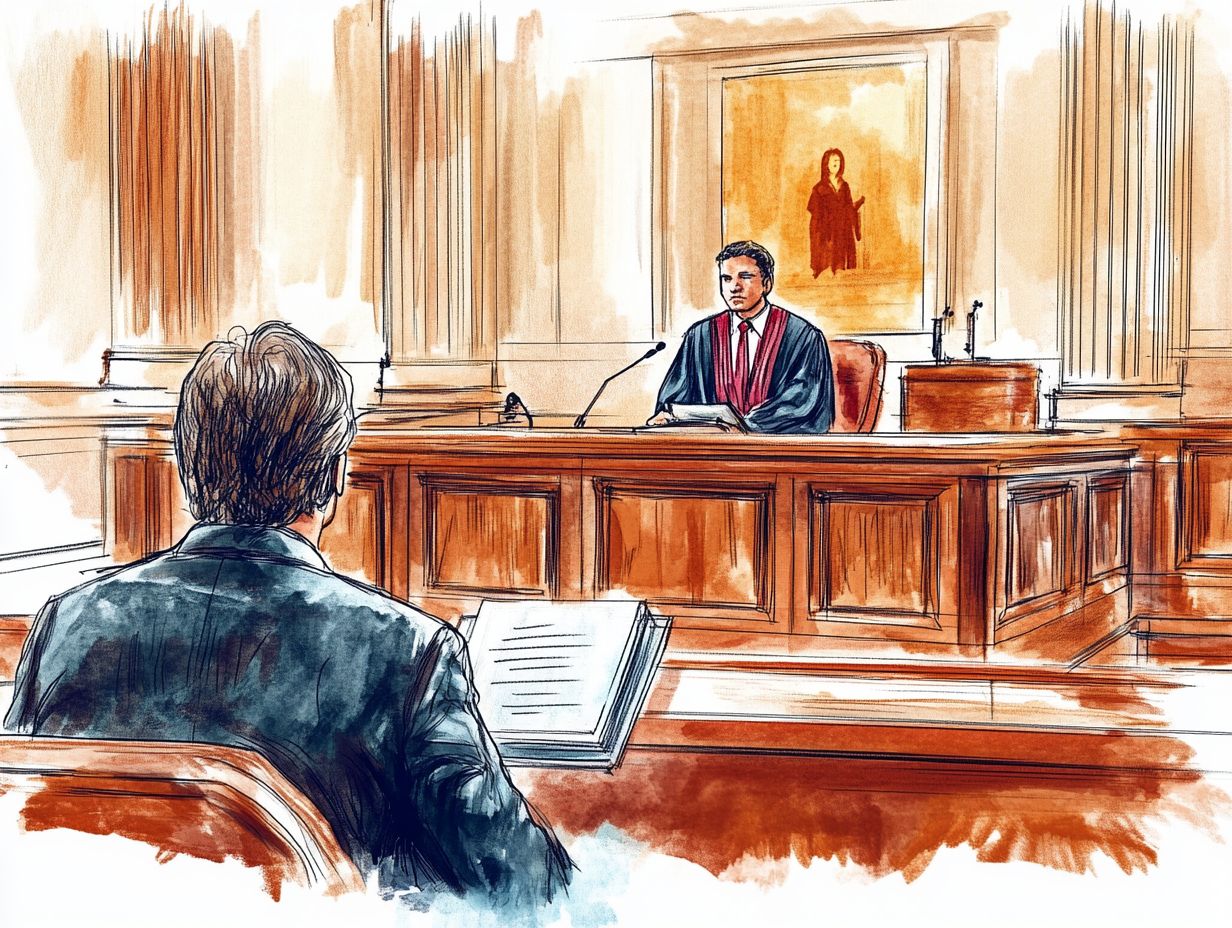
Witness testimony can make or break a defense case. Prepare thoroughly to ensure your witnesses shine and effectively counter challenges.
The Importance of Witness Testimony in Defense
Witness testimony holds immense importance in defending against prosecution, as it can profoundly shape juror perceptions and the dynamics of the courtroom.
In an adversarial system where the stakes are high, delivering effective testimony from witnesses is crucial for establishing their credibility and providing essential context for the proceedings.
Understanding how witness demeanor and engagement can influence juror attention is vital for a successful defense strategy.
Why Witness Testimony is Crucial for Defense
Witness testimony is vital for your defense; it not only provides essential factual evidence but also shapes the entire narrative of the trial. This influences how the jury perceives the case and ultimately their decisions.
Consider this: the demeanor and clarity of a witness can strongly impact perceptions. For instance, in a high-profile assault case, a witness who remained calm and articulate under cross-examination helped the defense craft a more credible narrative, which contributed to a favorable verdict.
When witnesses possess effective communication skills, they can convey their observations in a manner that resonates with jurors. Additionally, managing emotions ensures that nervousness doesn’t overshadow their recollections.
In another case involving a theft accusation, dispassionate testimonies weakened the prosecution’s arguments, illustrating just how crucial a well-prepared witness can be in legal defense strategies.
Preparing for Witness Testimony
Preparing for witness testimony requires a comprehensive approach that blends evidence gathering and crafting effective communication strategies while ensuring the witness is expertly trained for courtroom interactions.
This preparation is not just meticulous; it’s your secret weapon for courtroom success! It sharpens the clarity of the testimony and bolsters the witness s confidence and credibility key elements that capture juror attention.
Your preparation strategies can include emotional regulation techniques and changing how you think about a situation, enabling witnesses to manage stress and maintain focus during their testimony. This way, they can deliver an accurate and compelling representation of the facts.
Gathering and Organizing Evidence
Gathering and organizing evidence is a vital step in ensuring that witness testimony is both factual and impactful, directly supporting courtroom procedures and the overall trial process.
This meticulous endeavor involves systematically collecting various forms of evidence photographs, documents, and witness statements while maintaining a coherent structure.
By adopting a methodical approach, you can effectively cross-reference pieces of information, enhancing the reliability of the testimony presented.
How you present evidence in court significantly influences the jury’s perception. A well-organized visual display not only aids in identifying witnesses but also bolsters their credibility.
Therefore, it s essential that all collected evidence is carefully curated and logically arranged to achieve the best possible impact during the proceedings.
Interviewing and Preparing Witnesses
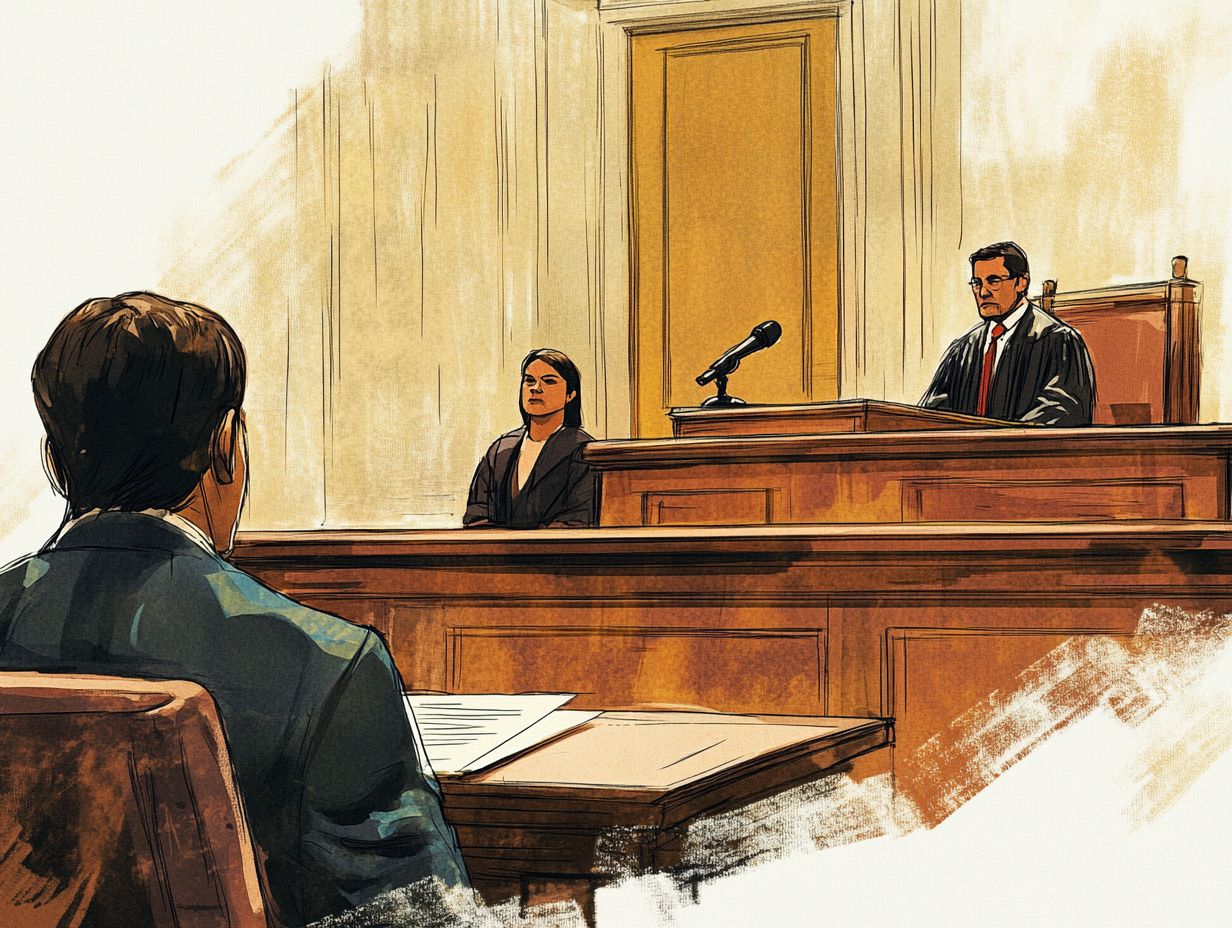
Interviewing and preparing witnesses requires good questioning skills and emotional awareness.
This approach boosts the witness’s confidence during their testimony.
By implementing targeted strategies that address the unique psychological needs of each individual, you can cultivate a supportive environment that makes all the difference.
These techniques not only enable witnesses to articulate their experiences with clarity but also alleviate anxiety, allowing them to concentrate on delivering their statements accurately.
Fostering trust and rapport between you and the witness encourages openness, unlocking deeper insights into their perspective.
This approach enhances performance in court, leading to reliable testimony and a fair outcome.
Presenting Witness Testimony in Court
Presenting witness testimony effectively is crucial for a successful trial outcome.
The ability to convey testimony clearly and persuasively is essential for establishing the credibility of the witness and bolstering your overall defense strategy.
Engaging with witnesses in a way that resonates with jurors can profoundly influence the trial’s outcome.
Effective Techniques and Strategies
Effective techniques and strategies for presenting witness testimony are essential.
Utilizing leading questions can guide witnesses to deliver their insights seamlessly.
Structuring the flow of questioning logically allows for a narrative that captivates the jury, transforming complex information into something more digestible.
Practicing witness performance can significantly reduce anxiety and enhance delivery, enabling jurors to connect with the testimony on a personal level.
By intentionally combining these approaches, you can elevate your overall trial strategy, highlighting key facts while fostering deeper engagement from the jurors with the evidence presented.
Challenges and Objections to Witness Testimony
Challenges and objections to witness testimony can arise during a trial, putting the credibility of the witness at risk.
It s essential to understand courtroom rules and the typical objections that may come into play.
Navigating these challenges requires adept cross-examination tactics to counter any claims against the witness.
Common Challenges and How to Overcome Them
Common challenges include:
- Inconsistencies
- Biases
- Emotional responses
These can undermine your credibility and the accuracy of your account.
To combat these issues, work closely with legal counsel to clarify your memories and manage any biases.
Incorporating emotional defense tactics like mindfulness techniques or relaxation exercises can also help, allowing you to present your testimony with greater clarity.
By understanding courtroom dynamics, you can navigate the pressures of giving testimony with confidence and composure.
Cross-Examination of Witness Testimony
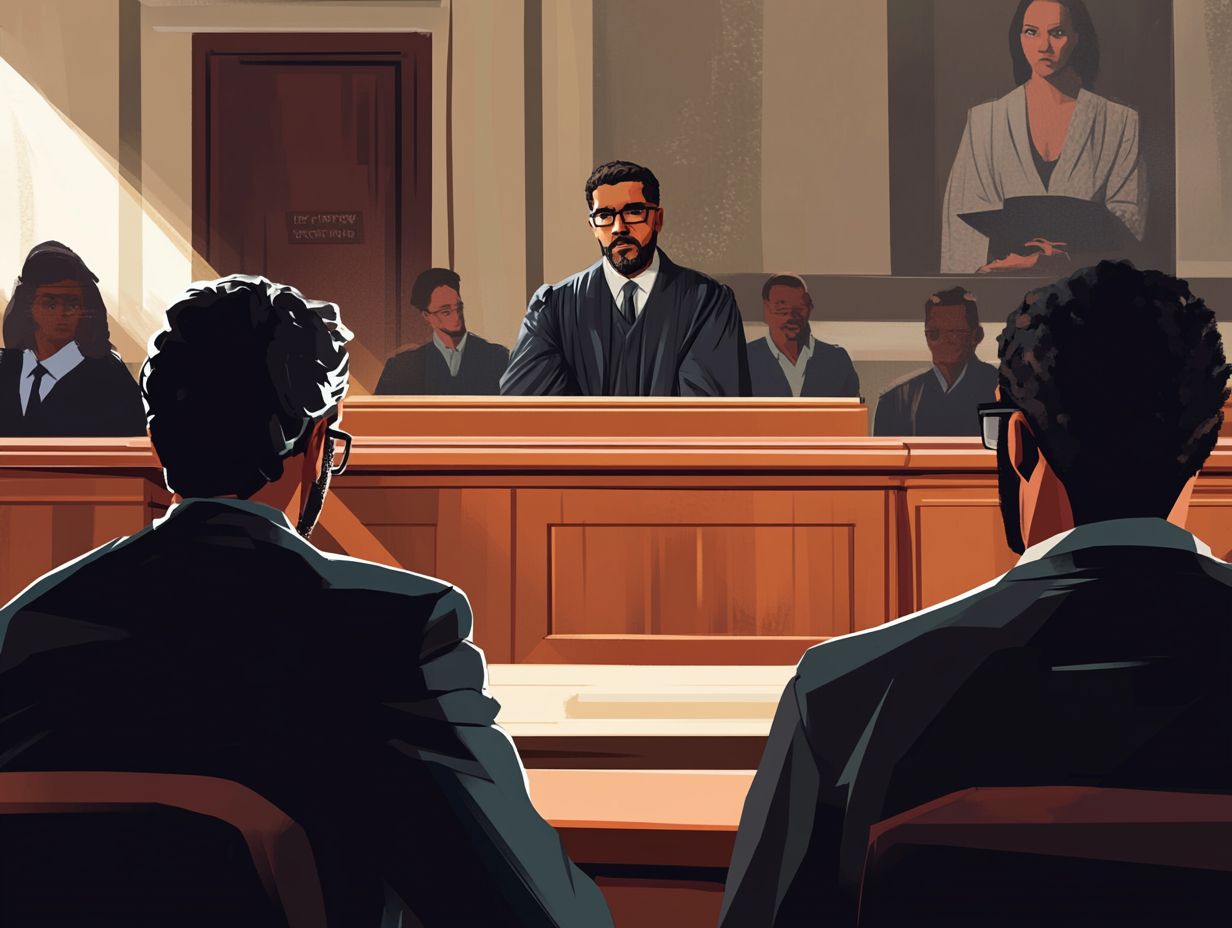
Cross-examination of witness testimony is a pivotal element of the trial process. It can uncover inconsistencies and question the credibility of the testimony presented.
Knowing how to use courtroom techniques, along with understanding the strategic deployment of questioning order and leading questions, are essential skills for both defense attorneys and prosecutors.
A well-done cross-examination can profoundly influence juror perception and enhance the overall effectiveness of the prosecution’s case.
Tips for Effective Cross-Examination
Effective cross-examination requires a firm understanding of courtroom tactics. You must adapt your questioning style based on the witness’s demeanor and responses.
By learning to read a witness’s body language and vocal cues, you can significantly shape the trajectory of your questioning.
Your goal should be to create a comfortable atmosphere for the witness while guiding them toward a critical line of inquiry. Anticipating potential answers and preparing follow-up questions allows you to maintain control over the conversation.
Listening attentively helps uncover inconsistencies and identify opportunities for deeper probing, leading to a compelling examination that may unveil the truth and enhance your legal argument.
Handling Inconsistent or Unreliable Witness Testimony
Navigating inconsistent or unreliable witness testimony is a formidable challenge for attorneys. This demands a strategic approach to preserve the integrity of the trial process.
Effective courtroom strategies are essential to tackle issues surrounding witness memory, helping to capture the jury’s focus on the relevant facts.
By understanding the psychological factors that lead to inconsistencies, you can refine your strategy, ensuring that witness credibility is maintained and not unjustly compromised.
How to Address and Discredit Inconsistencies
Addressing and discrediting inconsistencies in witness testimony requires careful application of courtroom techniques. A deep understanding of psychological factors like emotional regulation and cognitive strategies is crucial.
Recognizing this is crucial for a successful case! Emotions can distort the accuracy of a witness’s account, leading to varying levels of confidence in their recollections.
Assisting witnesses in managing their emotional responses can significantly enhance the reliability of their testimonies.
Techniques like cognitive reappraisal enable witnesses to reinterpret their feelings about traumatic events, helping prevent heightened stress from clouding their memories.
As an attorney or judge, cultivate an environment that encourages openness and minimizes intimidation. This supports witnesses in delivering truthful and consistent accounts during critical court proceedings.
Preguntas Frecuentes
1. Qu es el testimonio de un testigo en un caso de defensa?

El testimonio de un testigo en un caso de defensa se refiere a las declaraciones hechas por individuos que tienen conocimiento directo o informaci n sobre los eventos en cuesti n. Pueden proporcionar pruebas cruciales para apoyar la afirmaci n de inocencia de un acusado.
2. C mo debo prepararme para manejar el testimonio de testigos en defensa?
Es importante revisar a fondo toda la evidencia y las declaraciones de los testigos antes del testimonio. Familiar zate con las declaraciones del testigo y los eventos que llevaron al caso.
Desarrolla una estrategia para interrogar al testigo y prep rate para contrarrestar cualquier posible desaf o a su credibilidad.
3. Puedo interrogar a un testigo en un caso de defensa?
S , el contra-interrogatorio es un aspecto crucial de manejar el testimonio de testigos en defensa. Permite a la defensa desafiar las declaraciones y la credibilidad del testigo, y presentar una versi n alternativa de los eventos.
Incorporating these techniques in your practice can significantly enhance your effectiveness in handling witness testimony.
4. C mo manejo a un testigo que no es cooperativo?
Si un testigo no coopera, mant n la calma y act a de forma profesional. Haz preguntas abiertas para conectar con l.
Si necesitas ayuda, habla con tu equipo de abogados sobre qu hacer.
5. Puedo usar testigos de car cter en un caso de defensa?
S , puedes usar testigos de car cter en defensa. Ellos pueden hablar sobre la buena reputaci n del acusado y su comportamiento respetuoso de la ley.
6. Qu debo hacer si el testimonio de un testigo contradice declaraciones anteriores?
Si el testimonio contradice declaraciones anteriores, interroga al testigo cuidadosamente. Esto puede debilitar su testimonio y ayudar a tu defensa.

